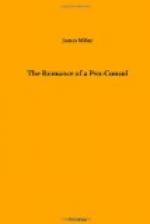’Conceive my surroundings! There I was, with Maori chiefs whom I had brought from Auckland and Wellington. They trusted me; they were helping me all they could to bring about a peace. This constitution, I discovered, would destroy, at one stroke, a treaty—that of Waitangi, which every Maori in New Zealand held to be sacred. It was a treaty securing them in their lands; it was their Magna Charta in every respect. Yet the constitution would go back upon all that, and I should be held traitor to every one of my pledges to the Maoris. Moreover, it would have seemed as if I had taken the chiefs away from their various tribes, in order that these might be the more readily despoiled of their lands.
’Its treatment of the Maoris made the constitution impossible, in my judgment, and there were other far-reaching objections. It was formed on the cast-iron methods of the Old World—the methods which, I held, ought to be kept absolutely out of the New World. My motto might have been, “Leave us to ourselves; let us try what we can contrive.” What was I to do with a constitution unjust to the bulk of the colonists, as well as to the Maoris; a plan going tilt against the federation idea which I hoped would, in future years, uprise in every country speaking the English tongue?
’What was I to do indeed? My instruction was not alone that of the Colonial Office; but the constitution had been sanctioned by Parliament. A man’s responsibility, in the largest sense, is, after adequate deliberation, to proceed as he determines to be just and wise. If he has to decide, not for himself only, but for others, unto future generations, there lies his course all the more. There was one clear line for me, simply to hang up the constitution, and intimate to the home authorities my ideas about it. This I did, and fortunately, as I thought, my plea prevailed with the Colonial Secretary and with Parliament. The latter not merely went back upon its act, a quite extraordinary event in English Parliamentary history, but empowered me to draw up another constitution for New Zealand.’
You seek, for a moment, to contemplate the Mother of Parliaments having a measure she had given forth, bluntly returned upon her. It was a trying experience, but she emerged from it more worthy than ever of her proud title. ‘We shall give him,’ Peel declared, when Sir George Grey went to New Zealand, ’an assurance of entire confidence. We shall entrust to him, so far as is consistent with the constitution and laws of this country, an unfettered discretion.’ Parliament lived up to that promise, and Sir George set himself to the mapping out of an adequate constitution.
‘The circumstances under which I drafted it,’ he resumed his account, ’were peculiar, not to say romantic. The folks in New Zealand were aware of the work that had been delegated to me, and of the date at which it must be carried out. I was to have the constitution going within five years. There were various interests, and some of these would advance the request, “Tell us what you are to recommend; let us have a part in framing the laws under which we are to be governed. You are an autocrat in your ways, and it is intolerable that we should not have a voice in the matter.”




